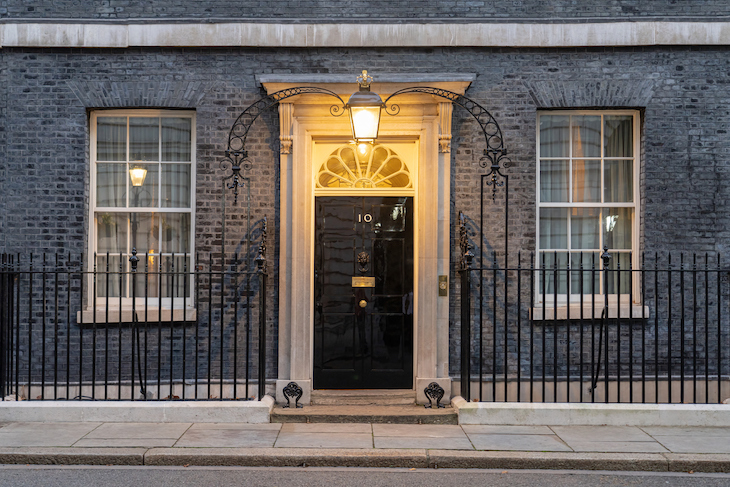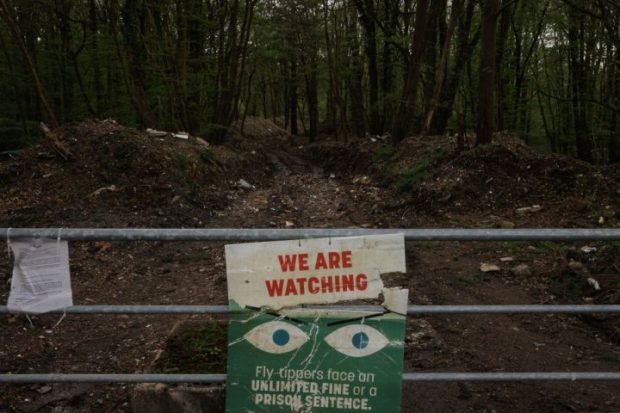This summer, horrified by the rising numbers of students no-platforming and harassing visiting speakers whose views they don’t like, the government anointed the Cambridge philosopher Arif Ahmed ‘free speech tsar’. Prof Ahmed said at the time that his new role, at least as he saw it, wasn’t a culture wars stunt: he was interested in protecting free expression across the political spectrum.
There is a culture of systematic no-platforming and double-cucked snowflakery, it turns out, in the supposedly pro-free-speech government
We have every reason to think he’s been beavering away since then to ensure our campuses continue to zing with the free and frank exchange of ideas, and good on him. But if he has any spare time, there’s something else that seems to merit his attention: a bigger and more consequential threat to free speech, I’d say, than the callow posturing of student unions. There is a culture of systematic no-platforming and double-cucked snowflakery, it turns out, in the supposedly pro-free-speech government that appointed him.
No fewer than 15 government departments, the Observer reported yesterday, have been aggressively vetting visiting speakers or expert contributors to policy panels. Vetting them in case they prove a security risk? No: vetting them in case they have ever said anything hurty-feelings-making about the government.
Officials have been told to comb through between three and five years’ worth of social media posts from potential invitees, and to check ‘at least’ the first five to ten pages of Google search results for terms such as ‘criticism of government or Prime Minister’. They’re expected to red-flag not just posts made in propria persona, but to check too that these experts haven’t ’liked’ or reposted critical things that other people have said. This doesn’t just apply to the subject area under consideration. A chemical weapons expert was disinvited from speaking at a defence conference because he’d had the temerity to post something critical of the government’s immigration policy.
Better yet, these officials are being asked to collate the transgressions they’ve found and put them into secret files, the better to disinvite these dangerous dissidents more quickly next time. ‘Make sure you record this information for future reference’, say the DCMS’s guidelines. Comparisons with the Stasi, or Hoover’s FBI, or Orwell’s Ministry of Love, may be a little hysterical but can we nevertheless agree that this is… not good?
Item: we’ve been paying for civil servants to waste hours of their time blacklisting people for their political views. Item: what’s been done is very likely unlawful, breaching (according to a lawyer consulted by the paper) data protection, equality and human rights legislation. Item, arguably most important item: it places what we might call ‘political correctness’ above the availability of a wide range of the best expert advice to government. You may know more than anyone else on earth about chemical weapons but, sorry pal, if you think our send-them-to-Rwanda scheme is silly then the Department of Defence is going to have to make do without your expertise.
It may do to mention, glancingly, that given that we’ve gone through four Prime Ministers during the vetting period, and any number of sackings and backstabbings and fallings-out, there’s a practical difficulty in knowing what counts as wrongthink in any case. If you tweeted a fortnight ago that you thought Suella Braverman was an attention-seeking maniac, you’d certainly have been on the naughty list; but would you be eligible to give, say, a speech on the pre-school curriculum to a DfE event again now that the PM has come round to your point of view?
That’s no more than a fun hypothetical: this is, as I say, a very bad thing in principle regardless of who ends up blacklisted as a result. The Cabinet Office, belatedly, seems to have noticed as much.
Or rather, the moment it became clear that their targeted surveillance system was going to be scrutinised in the pages of a Sunday paper, they performed a reverse-ferret of immaculate Sir Humphreyishness. A spokesman told the paper that ‘The government is committed to protecting free speech. We are reviewing the guidance and have temporarily withdrawn it to prevent any misinterpretation of the rules.’ I love ‘to prevent any misinterpretation’, don’t you?
It remains to be established how this stupid petulant, wasteful system of offence archaeology made its way through Whitehall. Could it be well-meaning civil servants muddled about what ‘impartiality’ is supposed to mean in practice? Or (more likely) Spads keen to keep everyone on message and avoid embarrassing headlines down the road? No question, in any large organisation there will be middle-ranking employees of the keen-to-please but not super well-endowed in the grey matter department type. And they will sometimes make daft decisions of which the C-suite will be unaware. We’ve already seen any number of companies in the last few years having to row back on some idiotic piece of virtue signalling from their social media departments.
But the fact that these guidelines have been written down in some detail, and that versions of the same policy seem to apply across more than a dozen government departments, rather implies that the orders came from on high. I don’t propose to put Dishy Rishi in the frame for this one, necessarily; this seems to have been rumbling on since long before he took the helm.
Still, in the interests of transparency – and given that senior politicians we thought were long gone all seem to return clanking their chains like Marley’s ghost – I think it would be very useful to know who gave the orders. What’s the betting it happens to be one of the very people who most love to sound off about cancel culture and free speech and snowflakes?
Got something to add? Join the discussion and comment below.
Get 10 issues for just $10
Subscribe to The Spectator Australia today for the next 10 magazine issues, plus full online access, for just $10.




















Comments
Don't miss out
Join the conversation with other Spectator Australia readers. Subscribe to leave a comment.
SUBSCRIBEAlready a subscriber? Log in